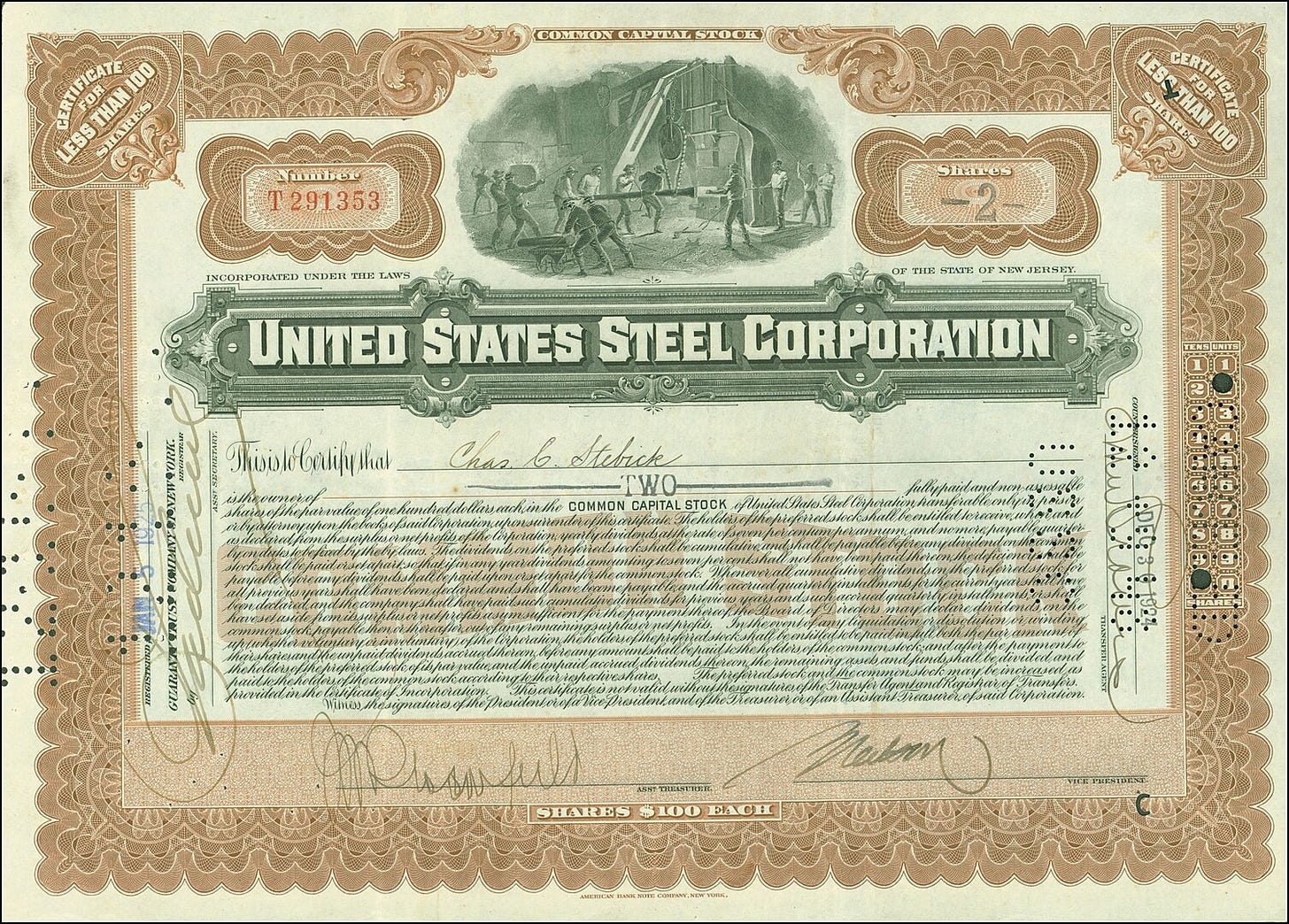
When I started looking at today’s main topic, I assumed at first that it would bring another refreshing break from presidential politics. How naive I was. Notwithstanding its political implications, “steel” is a topic worth looking at.
U.S. Steel, the 24th largest steel producer in the world, has agreed to be acquired in an all-cash transaction by Nippon Steel, Japan’s largest steel company and the fourth largest globally, for $14.1 billion. If successful, the move would likely create the largest steel company in the world. What’s in it for Nippon to justify that kind of cash outlay? Among other things, according to the Wall Street Journal:
A takeover of U.S. Steel would make Nippon Steel, already one of the world’s largest steelmakers, one of the top suppliers to the American auto industry. The deal would give the Tokyo-based company access in the U.S. to specialized steel used in electric vehicle motors, along with steel used in appliances and construction materials.
Following the transaction, US Steel would maintain its own name, brand and headquarters in Pittsburgh. There are national security implications, so in order to gain approval for the acquisition, the deal has to pass muster with the Committee on Foreign Investment in the United States (CFIUS) and the U.S. Department of Justice:
Finally, of course, there are the political considerations. As you might expect, the United Steelworkers union has come out strongly against the deal over concerns that Nippon might not keep its union mills open and honor existing contract terms. For its part, the Japanese company has said it will honor the union contract until it expires in 2026 and will not lay off any workers until then. US Steel itself, however, has warned of plant closings if the deal collapses.
President Biden is expected to try to block the deal, a development that has sent US Steel’s stock tumbling by 20%. In Pittsburgh over the holiday weekend, Vice President Kamala Harris signaled in a joint appearance with Biden that she, too, wants US Steel to “remain American-owned and American-operated.”
Interestingly, many economic conservatives have come out in favor of the deal. The Wall Street Journal editorial board embraced it yesterday. The libertarian Reason magazine argued in favor of the acquisition on … well, libertarian grounds:
The deal with Nippon isn’t some foreign invasion; it’s a mutually beneficial deal executed with the consent of U.S. Steel’s leaders. Why should they have to get permission from the president to do business?
But it gets much more interesting that this. Both former President Donald Trump and his running mate J.D. Vance has also come out against the deal. Indeed, Trump signaled as early as February that he would block the deal if elected president once again. Vance insisted late last year that a “critical piece of America’s defense industrial base” would be “auctioned off to foreigners for cash.”
In its editorial, the WSJ took no prisoners:
A sign of the rotten political times is that President Biden, Kamala Harris, Donald Trump and JD Vance all agree on the dumbest economic idea of the presidential campaign so far: opposing Nippon Steel’s $14.1 billion acquisition of U.S. Steel.
I have a rather unsophisticated theory, but hear me out: Both campaigns are worried about losing support in Pennsylvania. And for good reason: it’s difficult to imagine either Trump or Harris winning the White House without carrying swing-state Pennsylvania and its 19 electoral votes. So both candidates have become what in 1992 the late Massachusetts Sen. Paul Tsongas called Bill Clinton, his then-rival for the Democratic presidential nomination: a “pander bear.”

If it were up to me, I’d be inclined to favor the deal. As for the unions, I don’t know what kinds of contracts Japanese steel workers have these days, but Japan has a long history of union labor dating at least as far back as the rise of its auto industry in the 1950s and 60s. For more, read David Halberstam’s exquisitely written and painstakingly researched book, The Reckoning.
If Nippon were a Chinese company, its acquisition would raise obvious national security concerns. Japan, while an industrial competitor, has nonetheless been a strategic ally since surrendering to us after World War II. But I’m not running for anything. The most I have to fear is an angry mob attacking me on social media — a regular occurrence for me anyway.
‘Code’ for ‘I’m one of you’
Speaking of social media, this is currently all the rage:
Yes, at this rally in Detroit on Monday, Harris is putting on a strange accent. But it’s called “code-switching” and it happens all the time. The denizens of X have accused Harris of trying to sound like Foghorn Leghorn, the legendary blowhard rooster on Looney Tunes.
As defined by Britannica, code-switching is the“process of shifting from one linguistic code (a language or dialect) to another, depending on the social context or conversational setting.” And as NPR reminds us, code-switching is often done — “both consciously and unconsciously — to act or talk more like those around them. In other words, to fit in.
My son grew up in Connecticut and went to college in Vermont. His service as a Marine Corps officer took him to Virginia, Florida and North Carolina. He now lives here in San Antonio. When he uses the plural pronoun for “you,” it’s “y’all” and has been for years.
A couple of weeks ago, I was getting some exercise in the pool at our apartment complex in San Antonio. Some kids were wading into the pool after school but, much to my amusement, they found the 85-degree water to be cold and they were reluctant to submerge their heads, even though the air temperature was about 100. I decided to give them some advice: “Y’all should stick your heads in the water. It’s refreshing.” To the best of my knowledge, that was my first “y’all” since I was a prepubescent kid in Dallas. Why did I do it? I guess I wanted to fit in and not come across as a square-peg, pale-faced Yankee.
As for politicians, they’re mostly phonies anyway. They rarely say in public what they’re thinking and talking about in private. I might add that the farther up the food chain you go, the bigger the phony.
If you want to find a great example of planned code-switching, look no further than Republican Sen. John Kennedy of Louisiana, the Oxford-educated lawyer who does his cornpone best to sound like Looney Tunes character Foghorn Leghorn — or Mr. Haney on Green Acres. Kennedy, a former Democrat who endorsed John Kerry for president in 2004, is far more skilled at code switching (and party switching) than Kamala Harris. And way better than me, y’all!







I too enjoyed The Reckoning. David Halberstam was a national treasure.
Advanced Southernese: Y’all is singular. All y’all is plural.